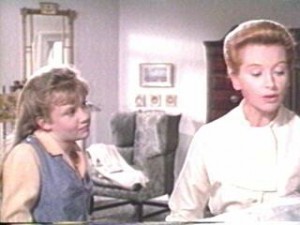One more positive ingredient—and it goes far to establish mood and character motifs—is Malcolm Arnold’s music, one of his best scores. Unfortunately no soundtrack albums, original or newly recorded, seem available. The English composer, who died in 2006, is best known for his score for The Bridge on the River Kwai, even though its most famous part, the “Colonel Bogey” March, was written some forty-three years earlier by Kenneth Alford (F. J. Ricketts). Arnold has penned scores equally as good, some better, including The Inn of the Sixth Happiness, David Copperfield (1969 TV movie) and, what may seem surprising, Trapeze, whose main title opening is reminiscent of Arnold’s original music for Kwai.
 The best part of Arnold’s underpinning in The Chalk Garden, and one of the longest stretches of music, occurs when Laurel sneaks into Miss Madrigal’s room, and from the top of a wardrobe removes the painter’s box that had caught her eye when the lady first arrived. She takes the box to a garden shed, opens it and, with some linseed oil, removes the paint smudges that partially conceal three letters: C.D.W. Laurel temporarily hides the box in the shed.
The best part of Arnold’s underpinning in The Chalk Garden, and one of the longest stretches of music, occurs when Laurel sneaks into Miss Madrigal’s room, and from the top of a wardrobe removes the painter’s box that had caught her eye when the lady first arrived. She takes the box to a garden shed, opens it and, with some linseed oil, removes the paint smudges that partially conceal three letters: C.D.W. Laurel temporarily hides the box in the shed.
All during her actions Arnold’s orchestra comes alive with unsettled woodwinds, percussion pricks, pizzicato strings and, of course, Laurel’s nervous, trilling motif—all with an undertow of dissonance and at a rather fast tempo, although Laurel moves furtively. The atmosphere of this music is maintained in a subsequent scene when Miss Madrigal returns to her room, finds the wardrobe doors ajar and knowingly looks up to see that the painter’s box is missing.
Following supper, Laurel slips up the stairs to Miss Madrigal’s room to return the box. She finds the door padlocked. Not to be out done, she climbs a tree, even sliding down the roof—with an appropriate Arnold glissando—to the window. In making her escape, however, she slips from a limb and is left hanging by her skirt, drawing everyone’s attention. Miss Madrigal has returned to her room, sees the window slightly open, which further suggests that Laurel isn’t as sly as she thinks she is, and glances at the top of the wardrobe. Yes, the painter’s box is back!
The next morning, Mrs. St. Maugham tends her garden while Laurel, wearing a straw hat with sunglasses perched on the front brim, watches as the victim of last night’s break-in is busy with a saw.
“Without even a word,” Laurel says, “she starts hacking off a branch of a 200-year-old tree.”
“But the branch is dead,” the elderly woman observes.
“Even dead things have their uses.” (Probably the best line in the film.)
“That’s a very deep thought, my dear,” Mrs. St. Maugham comments.
As has been seen, the garden is symbolic of the child, for nothing can flourish here—neither the flowers in their soil nor the child in this house.
.
Excellent Review comments. This article brings the film alive, and I haven’t seen it in thirty five years.
I enjoyed reading your review very much. It is very well written indeed.
As far as I know, the cliffs shown in the film are the White Cliffs of Dover
and, another point; Edith Evans was already a Dame at the time of filming.
Best Regards,
E De Martino
I simply adore this movie and wish it were on TV at least once a year.
Wonderful review, and thanks for the expanded comments on the musical score. Music can matter very much in film. Possibly Hayley Mills best performance and best film.
Wonderful review of one of the best movies I have ever watched. I am trying my level best to recall the ending scene in the play and the conversation between Mrs. St. Maugham and Mrs. Madrigal. It’s about secret that couldn’t be extracted by the interlocutor. Something like –“Why should I reveal what no one has been able to find out so far?” It was a more dramatic line of course. Can someone recall that conversation please?
“What learned men at the top of their profession couldn’t find out in nine days – why should you know?”
The film is an overproduced and watered down version of the play. The characters have been simplified and made less odd. Not a waste of time exactly, but a waste of a complex, quirky drama.